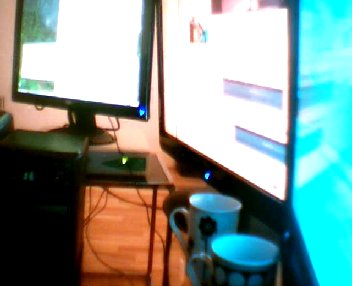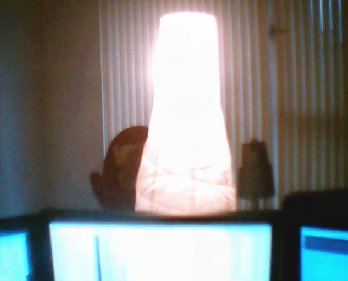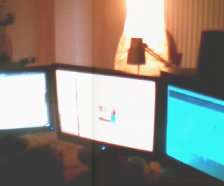Topic Exhaustion
 here is this thing about blogging which almost everyone who blogs has experienced at one stage, especially after blogging a lot (in the past 5 years I wrote over 15,000 blog posts). There is an understandable reluctance to write about something which was covered before and can therefore be addressed by linkage, unless things have changed considerably since it was written (in most cases, linkage with a small corrective remark would do). When that phase is reached, one tends to observe the news and look for new material to ‘feed on’, so to speak (putting it crudely).
here is this thing about blogging which almost everyone who blogs has experienced at one stage, especially after blogging a lot (in the past 5 years I wrote over 15,000 blog posts). There is an understandable reluctance to write about something which was covered before and can therefore be addressed by linkage, unless things have changed considerably since it was written (in most cases, linkage with a small corrective remark would do). When that phase is reached, one tends to observe the news and look for new material to ‘feed on’, so to speak (putting it crudely).
This blog had published about 1,000 posts before I started writing in another blog (the main blog I write for is still Techrights). My personal life and tricks for management of work are already thoroughly covered here (available through the archives) and other bloggers seem to have followed similar trajectories because other people care about events and ideas, not people. Once there is an exhaustion of subjects to write about regarding one’s life, a writer would naturally write about his/her surroundings. Making critical assessments of different things in the world does not take much effort, but it does take perseverance. There is usually little or no incentive in it. So what is it that motivates people to read the news and remark on it? Sheer boredom or media hype? Whatever it is, the more the issues are brought up, the more a person is likely to become emotionally attached to them and then seek a solution. At the moment my goal is to help abolish software patents. There is never a lack of work to be done in this area and progress is always made towards attaining this goal.
Have topics been exhausted then? Never.






 Filed under:
Filed under:  ack in the days, people created Geocities-hosted Web sites. Well, Yahoo! has axed it, shortly after getting abducted by Microsoft in fact, so Geocities is no more (although many sites similar to it still exist). I created my site there in 1997/1998 and a few years later I got interested in Open Diary, which in some sense resembles Live Journal. Further down the line there was the phenomenon of blogging, which started in particular sites like Blogspot and Blogger, among many more (some of them are not surviving well). Free software like B2 and WordPress soon filled a gap and enabled more and more people to take control of their blogging platform and also register their own sites for the purpose. Around the same time, sites like MySpace grew, but they soon perished mostly because of competition which included an extension to ‘people-indexing’ services (resembling classmates reunion sites). Facebook was prominent among those. For news and discussion people had Digg, Reddit, and several more large sites, Many experiments emulating the above failed miserably for reasons that would require a separate long post. Later on, in recent years, celebrities joined Twitter and helped it grow very quickly, along with Free software clones such as Identi.ca. What joins together many of those services and pieces of Free software one can download to substitute the hosted prison is that they provide people with a place to express themselves and also find out what others are thinking. The thoughts of others are sometimes expressed by citation (news) or multimedia. It all helps weaken the cetralisation of so-called ‘mass media’ and it empowers people. This is one of the better achievements of the Web — that alongside wikis such as Wikipedia, but that’s another category of sites and a subject for another day.
ack in the days, people created Geocities-hosted Web sites. Well, Yahoo! has axed it, shortly after getting abducted by Microsoft in fact, so Geocities is no more (although many sites similar to it still exist). I created my site there in 1997/1998 and a few years later I got interested in Open Diary, which in some sense resembles Live Journal. Further down the line there was the phenomenon of blogging, which started in particular sites like Blogspot and Blogger, among many more (some of them are not surviving well). Free software like B2 and WordPress soon filled a gap and enabled more and more people to take control of their blogging platform and also register their own sites for the purpose. Around the same time, sites like MySpace grew, but they soon perished mostly because of competition which included an extension to ‘people-indexing’ services (resembling classmates reunion sites). Facebook was prominent among those. For news and discussion people had Digg, Reddit, and several more large sites, Many experiments emulating the above failed miserably for reasons that would require a separate long post. Later on, in recent years, celebrities joined Twitter and helped it grow very quickly, along with Free software clones such as Identi.ca. What joins together many of those services and pieces of Free software one can download to substitute the hosted prison is that they provide people with a place to express themselves and also find out what others are thinking. The thoughts of others are sometimes expressed by citation (news) or multimedia. It all helps weaken the cetralisation of so-called ‘mass media’ and it empowers people. This is one of the better achievements of the Web — that alongside wikis such as Wikipedia, but that’s another category of sites and a subject for another day. INALLY, after nearly a week since taking and returning from a break, I received the server I have been waiting for. It arrived on Monday afternoon and today I finished configuring it, running alongside the triple-head workstation which I will use to do computer vision jobs and other development/admin work. The research requires a lot of screen space and sometimes the RAM/CPUload goes rather high, which helps not at all unless there is a second motherboard at hand (and a fallback machine.
INALLY, after nearly a week since taking and returning from a break, I received the server I have been waiting for. It arrived on Monday afternoon and today I finished configuring it, running alongside the triple-head workstation which I will use to do computer vision jobs and other development/admin work. The research requires a lot of screen space and sometimes the RAM/CPUload goes rather high, which helps not at all unless there is a second motherboard at hand (and a fallback machine.




 aving discussed the subject with half a dozen people over the past week or so, it seems clear that the threat of radiation is underplayed by companies that make business out of it (X-ray for the most part, if not nuclear energy too). The crux of the argument is that, just as people are increasingly not allowed to smoke in pubs due to people who work there (not always out of choice), in places where radiation is abundant, e.g. scanning facilities in hospitals and airports, people’s right to deny and avoid exposure to radiation should be respected. In companies where CT scanners are tested, even software developers are required to be exposed to radiation (my siblings) and sign a sort of waiver that removes liability. In more and more airports not only suitcases are subjected to X-ray treatment but humans too; they are not even given alternative options, except not work (in the former case) or not fly (in the latter case). The attitude ought to change. As someone with doctoral qualifications in the area of medical imaging, I occasionally try to raise the issue (not confront) those who are victim of this status quo (e.g. hospital workers who spend hours in particular rooms and particular airport staff standing adjacent to high-power scanners), but it is not easy to reach a solution which does not leave both sides with relative discomfort.
aving discussed the subject with half a dozen people over the past week or so, it seems clear that the threat of radiation is underplayed by companies that make business out of it (X-ray for the most part, if not nuclear energy too). The crux of the argument is that, just as people are increasingly not allowed to smoke in pubs due to people who work there (not always out of choice), in places where radiation is abundant, e.g. scanning facilities in hospitals and airports, people’s right to deny and avoid exposure to radiation should be respected. In companies where CT scanners are tested, even software developers are required to be exposed to radiation (my siblings) and sign a sort of waiver that removes liability. In more and more airports not only suitcases are subjected to X-ray treatment but humans too; they are not even given alternative options, except not work (in the former case) or not fly (in the latter case). The attitude ought to change. As someone with doctoral qualifications in the area of medical imaging, I occasionally try to raise the issue (not confront) those who are victim of this status quo (e.g. hospital workers who spend hours in particular rooms and particular airport staff standing adjacent to high-power scanners), but it is not easy to reach a solution which does not leave both sides with relative discomfort.
 am well past my
am well past my